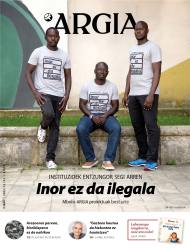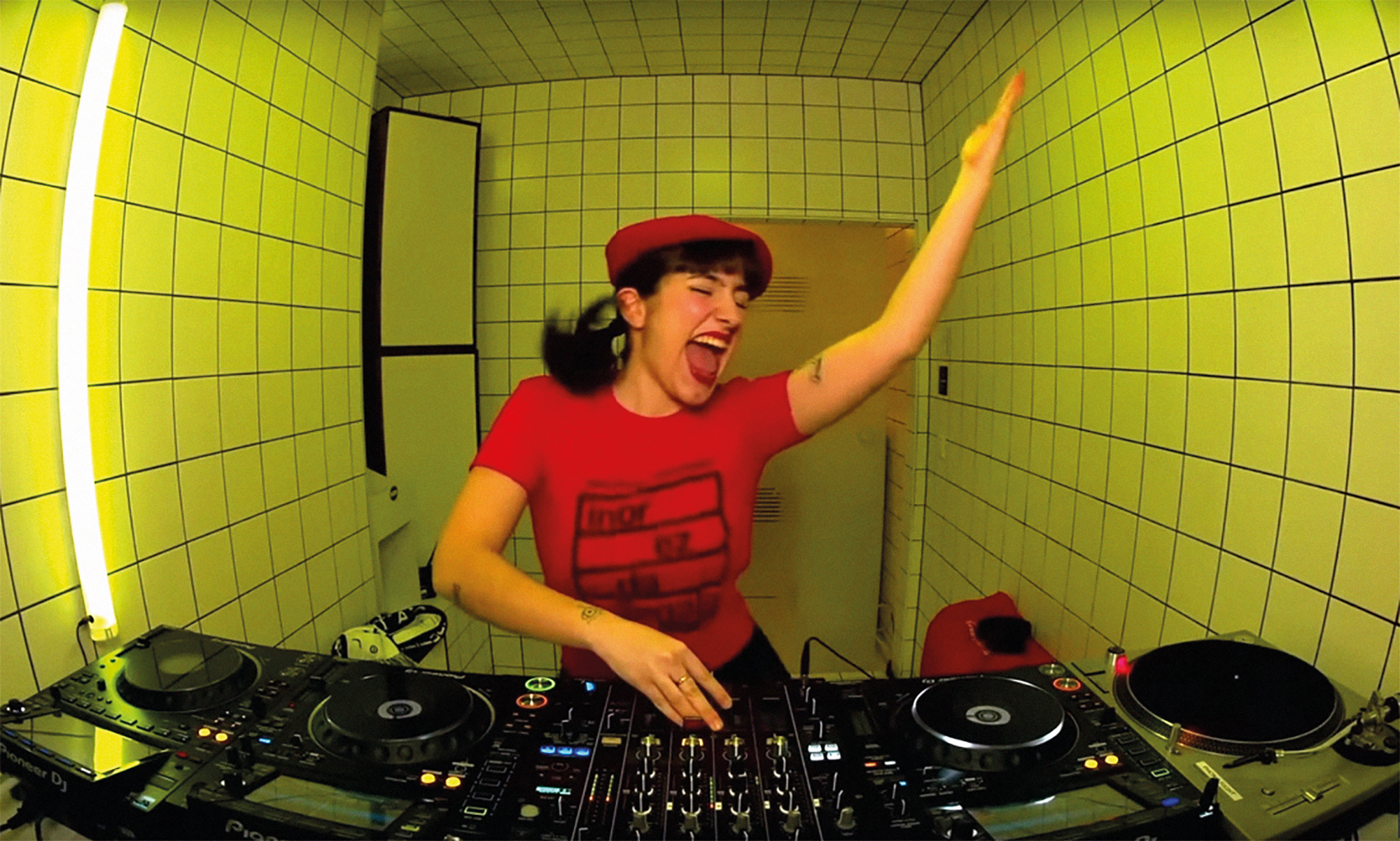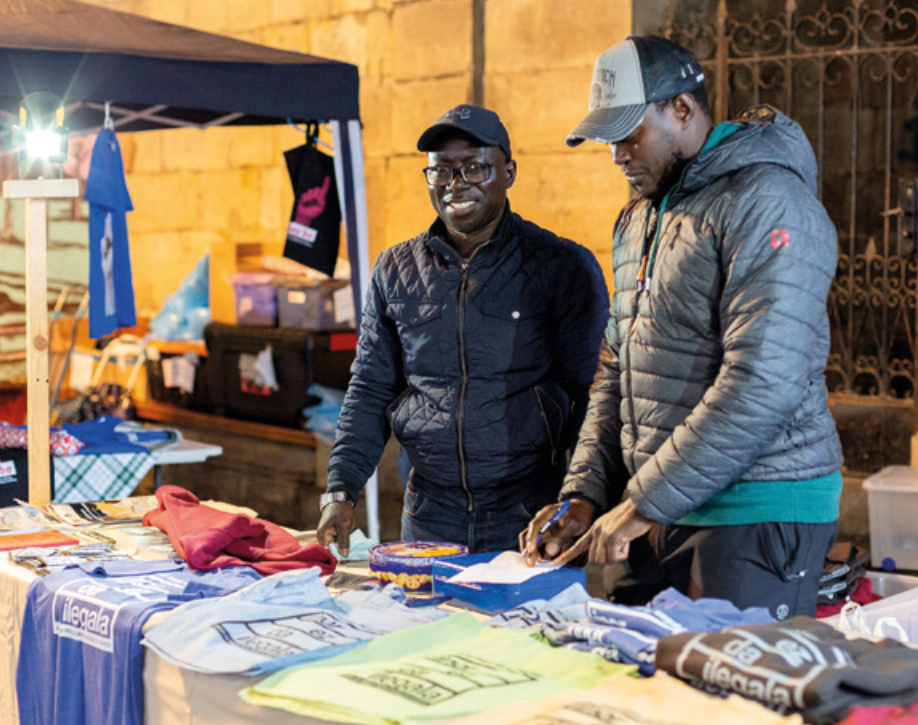Five years nobody claims the illegal
- For five years, the Inor ez da Ilegala project has deployed shirts, jerseys and handbags with the motto of the rights of migrants; the cooperation and solidarity initiative has given us many stories and experiences; and, unfortunately, the project is still more alive than ever, the cruel migration policy and the persecution of migrants.
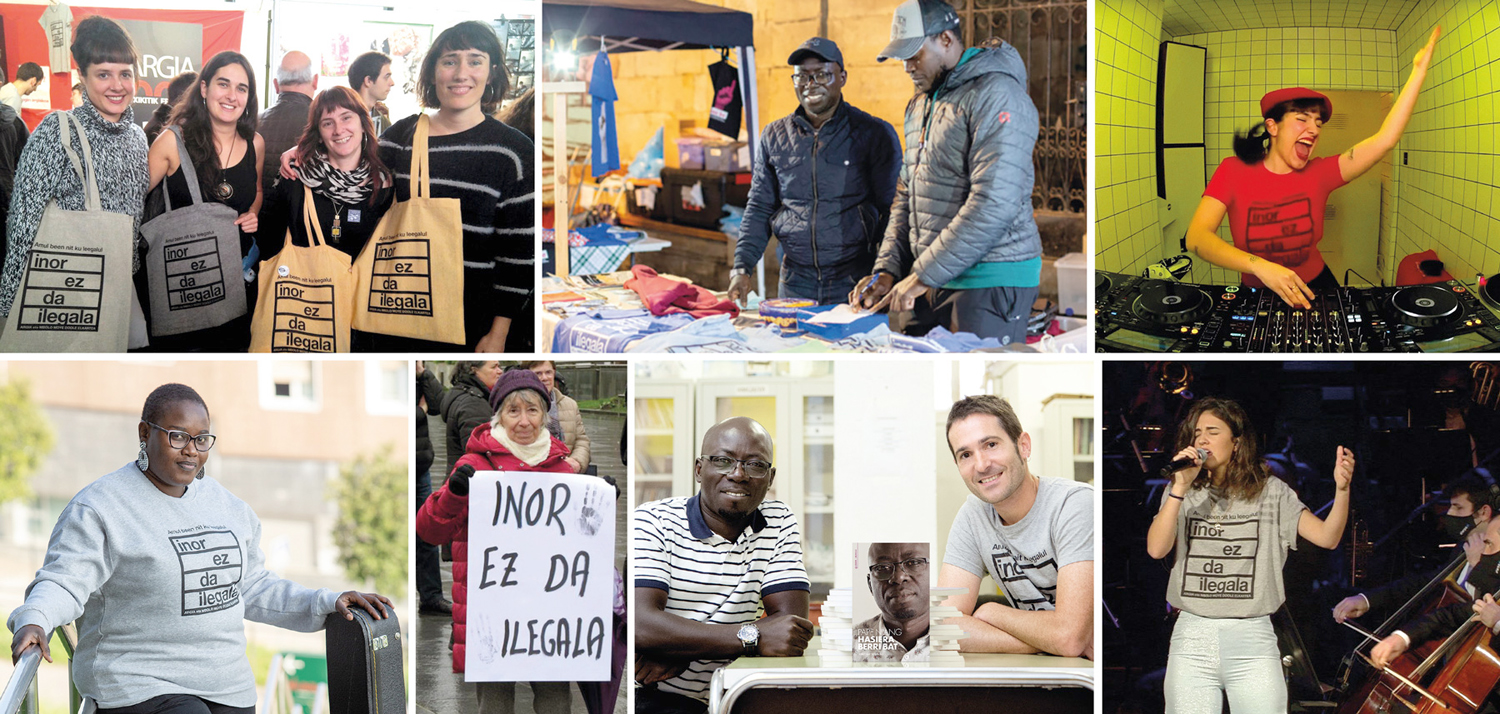
Start in 2018 No one is illegal. ARGIA addressed the Association of Senegalese traders in Bilbao, Mbolo Moye Doole, around an article. Many of them had taken the necessary steps to stop being a paperless manterer to become a legal street vendor, but they were hit hard by the administration. Baba Mbay told us: “In 2015, we got a self-employed license to work as street vendors and were granted a one-year residence permit. After a year of social security contributions, they showed us and renewed the residence permit for another two years. That was the treatment and they demanded a minimum quote of EUR 200 in order to be able to continue living and working on it. But from one day to the next the Spanish Aliens Act has decided that without a minimum contribution of EUR 800 they will not renew the papers, and we cannot reach that figure. In a few months we got 200 euros, in another 250, we added taxes and bills and got the accounts.” In many cities they became more flexible and did not require a minimum of EUR 800 to renew the residence permit, but they decided to apply the law rigorously in Bilbao. “If we take away the role, everything we have done will be of no use, we will return to the underground, to poverty, we cannot move around and visit our country and our family and friends, we cannot do decent work. We will go from being street vendors to being manteros, always running and fleeing from the police, fearing that they will catch us without papers, perhaps because they can take us to the CIE immigration center of Madrid, or because after so many years here they can expel us any day. And living like this, that in the head, is terrible.”
It was one more example of policies against migrants, one more example of institutional racism and xenophobia, but also the seed of a relationship: LIGHT to Bolus. The desire to do something together and the need to reinforce projects mutually, to show injustice in capitals were awakened. This is how grey t-shirts centered on repulsion were born: No one is illegal in Basque, Amul been nit ku leegalul wolof.
Bouba Diouf: "The situation is harsh and not only the newcomers, sometimes those who are here, if they do not have help, it is very difficult; we use the money from the project to help them all"
Mbolo exceeds EUR 30,000
“The beginning of the project was very nice for us, powerful, and we were very encouraged and involved in Mbolon,” says Bouba Diouf. Mbolo's colleague has been very present in the project since its inception, selling harvested clothes, and currently continues in Mbolo, combining works and tasks. For each sale by ARGIA, half of the profits are intended to strengthen the ARGIA project and the other half to the Mbolo association. When the sale is carried out by the bolus itself, the money obtained by the Senegalese from Bilbao is slightly higher. Until last October, the project has left 30,772 euros and can end the year with about 3,000 euros more, thanks to the Durango Fair and Christmas. The sellers themselves decide how to manage the money for Mbolo. At first the money was set aside to fund the cooperative, but the idea was broken after the deal and, in addition, seriously damaged the pandemics, using the money obtained until then to create a resistance box: “You couldn’t get out on the street, you couldn’t sell anything, many families around us were in extreme need and we thought we could use the money to help those in the worst situation,” Diouf explains. The Senegalese bilbaíno says that the resistance box maintains its role in the pandemic: “The situation is still harsh, more and more people are coming, and many need help, not only the newcomers, sometimes the ones here, if they don’t have help, they are very difficult and we use the project money to help them.” However, he stressed that an amount is being kept, “for harder times he will be there”, and they have some project in mind: “Mbolon has always been a lot of movement, some come, others go… but if we have ideas, we need to add points of view.”
Beyond economics, Diouf stresses that the initiative has served to spread the message: “Euskal Herria is a fighting people, is used to defending rights, and what we have extended with this project is also a fighting project. In short, because we are migrants, because we are black, we suffer a strong oppression that we have spread. Even, the project has given us a lot of visibility, already there are people who know all over Euskal Herria that in Bilbao there is an association of Bizkaia manteros called Mbolo Moye Doole! That’s good for us.”
Bouba Diouf himself will act on the days of the Durango Fair, in the position we usually put on the portico of the church, along with ARGIA colleague Mikel Olabide. Because collaboration is still alive, and that collaboration has left many years of experience and experience. Among them, a book and a fruitful series of tertulias.
"Euskal Herria is a fighting people, is used to defending rights and ours is a fighting project. People already know that in Bilbao there is an association of Bizkaia manteros called Mbolo Moye Doole!"
Pape Niang. A new start
He met Mbolo's then-president, Pape Niang, and it was almost a natural step to take a book about him. Why Pape? Because it has life, experience and reflections worthy of being told: He took life in Senegal; how he made Dakar, to the capital, in search of a better life; why he decided to go to Europe; what he hated lived on that long and hard journey, whether he crossed Africa or crossed the Mediterranean in the boat; what he found in Europe; what is living without papers in Euskal Herria; the hope raised by the dream of creating a cooperative... A new beginning in the book will undress the protagonist and report his pains and joys. “If we tell what we live and suffer, maybe people understand what migration is, make the effort to get on our skin,” he says. “In the migratory process everything that has remained on the road had a lot to tell and it is important to convey the message of all these people, not only to say that in the Mediterranean many people have died, but to explain why.”
Niang's journey, of course, has not only been physical, but has also made an inner journey that has greatly influenced his gaze at the world. The book discusses several topics: What influence (and what responsibility) Europe has and neocolonialism in African life; how it is seen from Africa Europe, how it is seen from Europe Africa; the business behind migration (“those who welcome you, the car driver who seeks you, the traffickers, those who facilitate the exit to the skate … This whole world benefits, the only thing that loses is migrant from what it is not, and what it is. Before that, we must value ourselves. Everyone should value people who have crossed the desert with a pack of five liters of water and cookies.”
Niange has harsh words: “Being a migrant is humiliating, let’s not say it’s from the south of the Sahara. If you're lucky enough to get a job, for example, what will that job look like, under what conditions? What they offer us is not a job, it is to lose our dignity. We are black and consider ourselves black.”
Since the publication of the book in June 2019, Pape Niang has been narrating his story through diverse locations and enriching encounters. One of the most exciting, undoubtedly, was the call last February by the Eibar Adult Education School at Armeria School. With the particularity that, unlike the previous interventions, the majority of the public had a foreign origin, and although Niange started his story habitually, he had to stop it at a given moment, because there were people who started crying, in the light of the experience itself, Niang came down from the stage to embrace the public, shared what they experienced, and at a time was also cathartic.
The migratory processes are very varied and each migrant and each migration is a world, but the Eibar program demonstrated that Paper is the reflection of the reality experienced by many others and that the need is behind most migrations, that there is a hard journey and that there is a society that often does not receive them well in the destination.
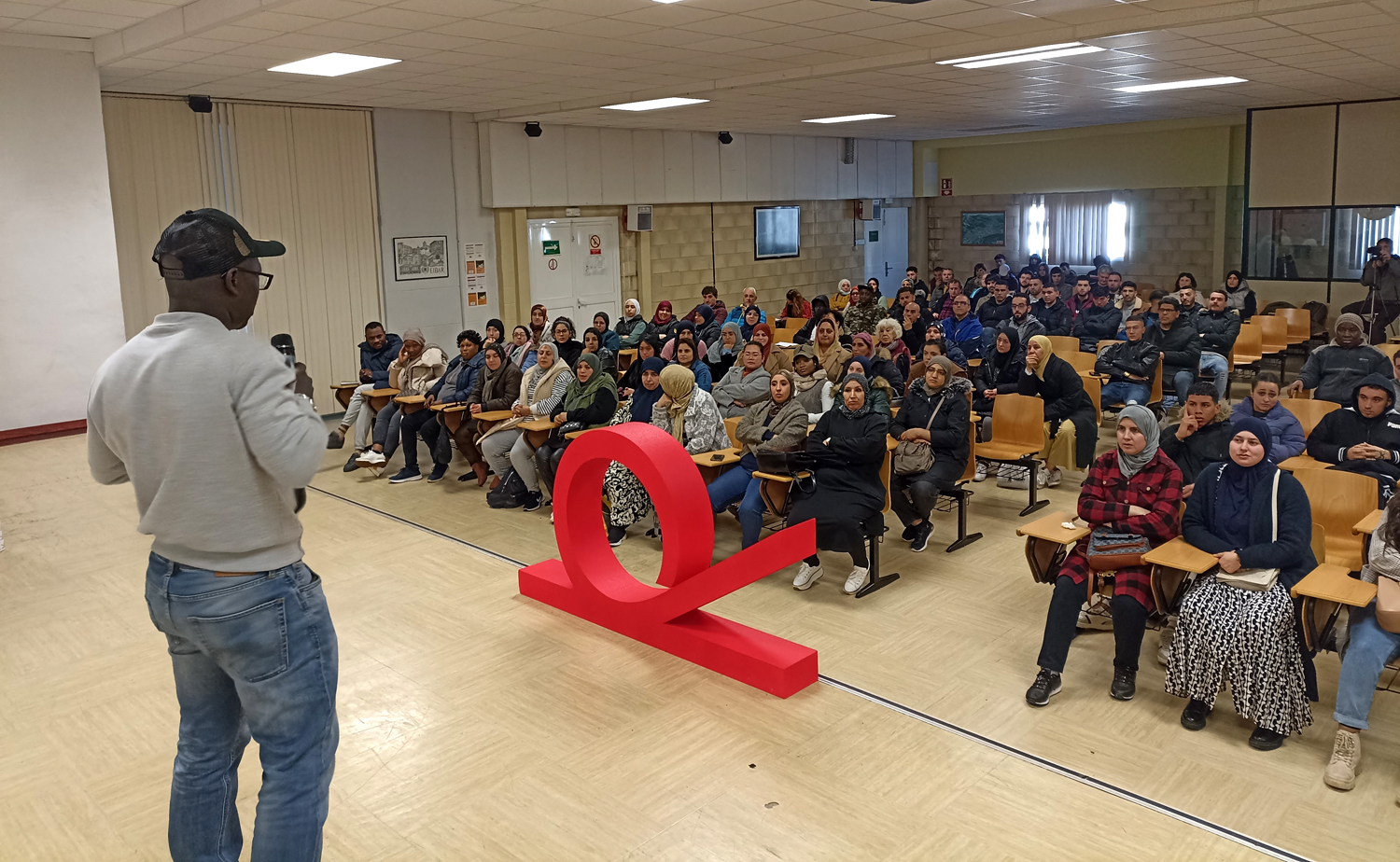
Against success and the reverse
No one is illegal, you'll have t-shirts in the closet, or you've certainly seen the t-shirt, jersey or bag in the neighborhood and in the village. He has also seen bertsolaris dresses, singers, politicians and actors, in press conferences and presentations, in a speaker. And that is that the cry has triumphed in Euskal Herria and we've heard more than one approaching Nobody's position is illegal, asking for a jersey and if there's no such color, choosing another color, and if there's no jersey, the t-shirt. Because the goal is No one is illegal to take it home to be proud on the street. To get them, go to the ARGIA Fair, request in Mbolo or approach the illegal selling points (Vitoria-Gasteiz Mara and Eva Forest Bibliotekopia, Laudio Aiaraldea, Durango Hitz, Bilbo Saha, La Sinsorga, Zirika and La casa compromised in San Sebastián, Ritadrián, Lauadrián
The success achieved reflects that Basque society has internalised the message that being an immigrant should not be a crime, roles should not be a privilege, but a right for everyone to lead a dignified life. The demand for such a basic demand, on the other hand, shows that injustice is still alive and empty by the institutions. What is more, if racism and xenophobia have not got any more steam, if it has not become more cruel legislation, such as rigour in border controls, the facilitation of deportations and expulsions, the reduction of rights and freedoms in the name of security, or other excuses. The French Government’s Immigration Act has recently been adopted, which has increased the obstacles to people in irregular situations in the health sector, social assistance and the process of obtaining papers.
How have we normalized people's lack of fundamental rights because of their origin? Migrant groups have on more than one occasion highlighted the racist, discriminatory and hippocratic nature of migration laws (as people from the Southern Hemisphere are limited to working under the worst conditions). Who benefits from not regularizing migrants, keeping people without papers and without rights? Especially those who benefit economically from exploitation. The migratory groups themselves began a strong movement after the pandemic, even in Euskal Herria, to call on governments to legalize the situation of those who are in an irregular situation, of all and of law (not only those who work in some sectors). They say in the manifesto that it is a matter of justice: “For all those who migrate justice, leaving their families and communities behind, suffering exploitation, incarceration and deportation. Justice for those who have died trying to cross seas, mountains, deserts and borders. Justice for those who have suffered and survived rape, torture and war.” Movement has lost strength, demand and need has not.
How have we normalized people's lack of fundamental rights because of their origin? Migrant groups began a strong movement to call on Governments to legalize the situation of all those in irregular situations.
Populist mantra
The cruelty of the law is partly legitimized by the racist and xenophobic discourse that we hear from each other. “The prejudices were there and they are there, and those speeches that mix everything have seen that politicians have acceptance, that they can take advantage of it (‘migrants are rapists, come from the subsidies to live, take away the work’), largely because of the economic crisis and elsewhere because the plurality of society has increased and many see that diversity as a threat”. This was explained by ARGIA activist Moha Gerehou. Former mayor of Vitoria, Javier Maroto, was a pioneer in the Populist Mantra, and as Baba’s colleague Mbaye Mbolo warns, politicians have a great responsibility, “because then people think they are legitimized to attack immigrants.” Xenophobic racist attacks rank first in Euskal Herria in the ranking of insults and physical aggressions, hate crimes.
And legal, institutional, discursive and physical harassment must be combined with police abuse. The racist group has frequently denounced what they suffer: to stay in the street without justifying, illegal arrests, racist police raids, humiliating explorations on the house portal, to illegally evict the dwellings of those who have permission to live without any judicial order and with force… In short, abuse of power and violence. “Just yesterday, in Bilbao, I saw four blacks facing the wall while the police were exploring them. 'Why are they always black and not white? I asked them. ‘whites are legal’, police responded to me as if being black meant being directly illegal. To me, one day and the next, they ask me for documentation, police of all colors. Because I'm black." Khadim is the testimony of Sambe, a member of Mbolo.
In the face of reactive discourses, Moha Gerehou calls for developing alternative discourses to unite in the struggle for social justice. We will continue to proudly shake the motto, in all colours, on t-shirts, jerseys or bags: nobody is illegal, amul been nu ku leegalul! Bouba Diouf makes it clear: “We need a force of solidarity, mutual help so that no one is left behind.”
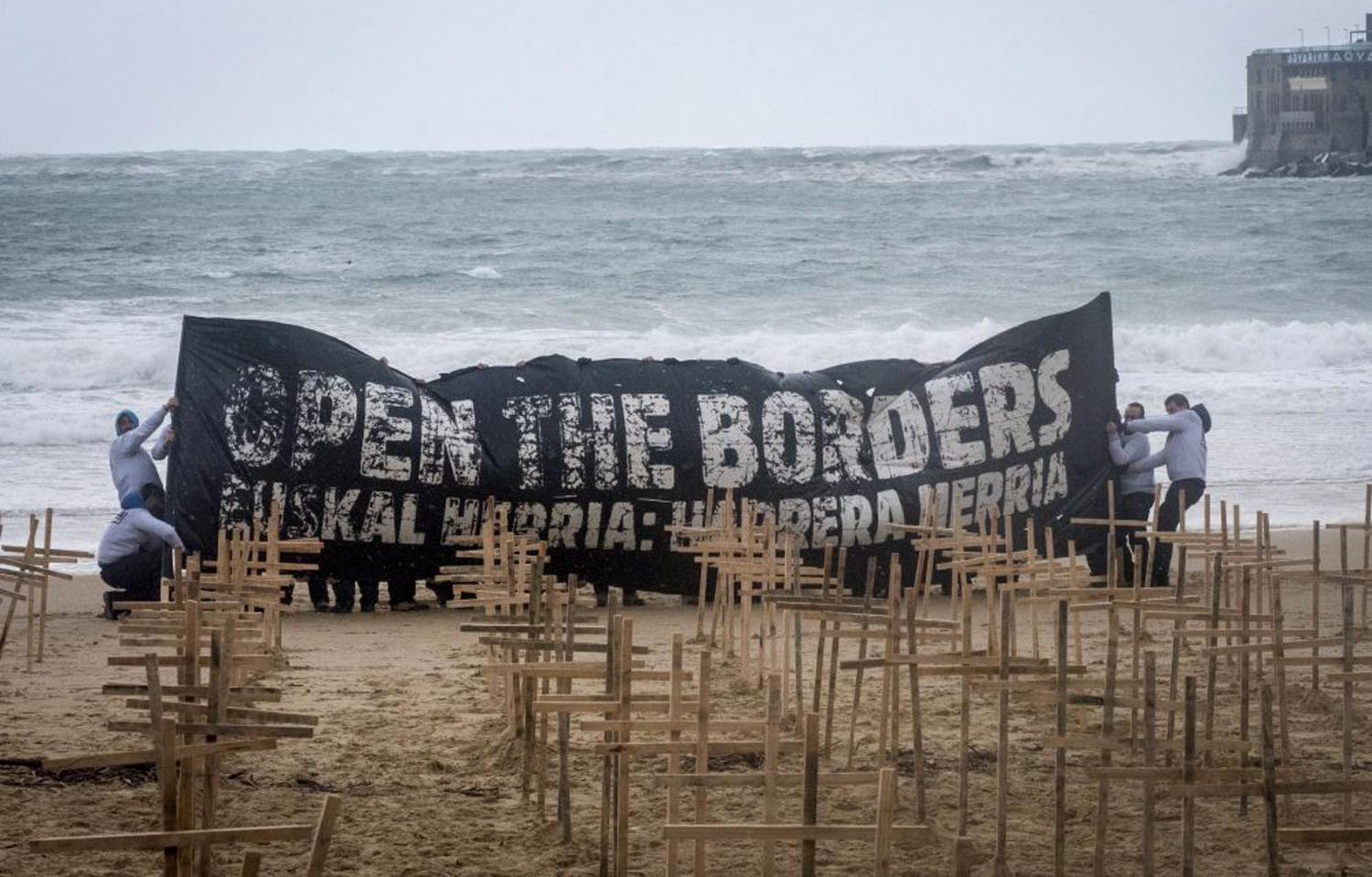
Aspaldian sarri ikusten dut kalean Inor ez da ilegala aldarria. Poltsan idatzita ez bada, jertsean; eta jertsean ez bada, kamisetan. Kolore askotan. Kolore guztiek, edozein izanik ere, eduki beharko baikenituzke eskubide berak. ARGIAk eta Mbolo elkarteak duela lau urte hasitako... [+]









